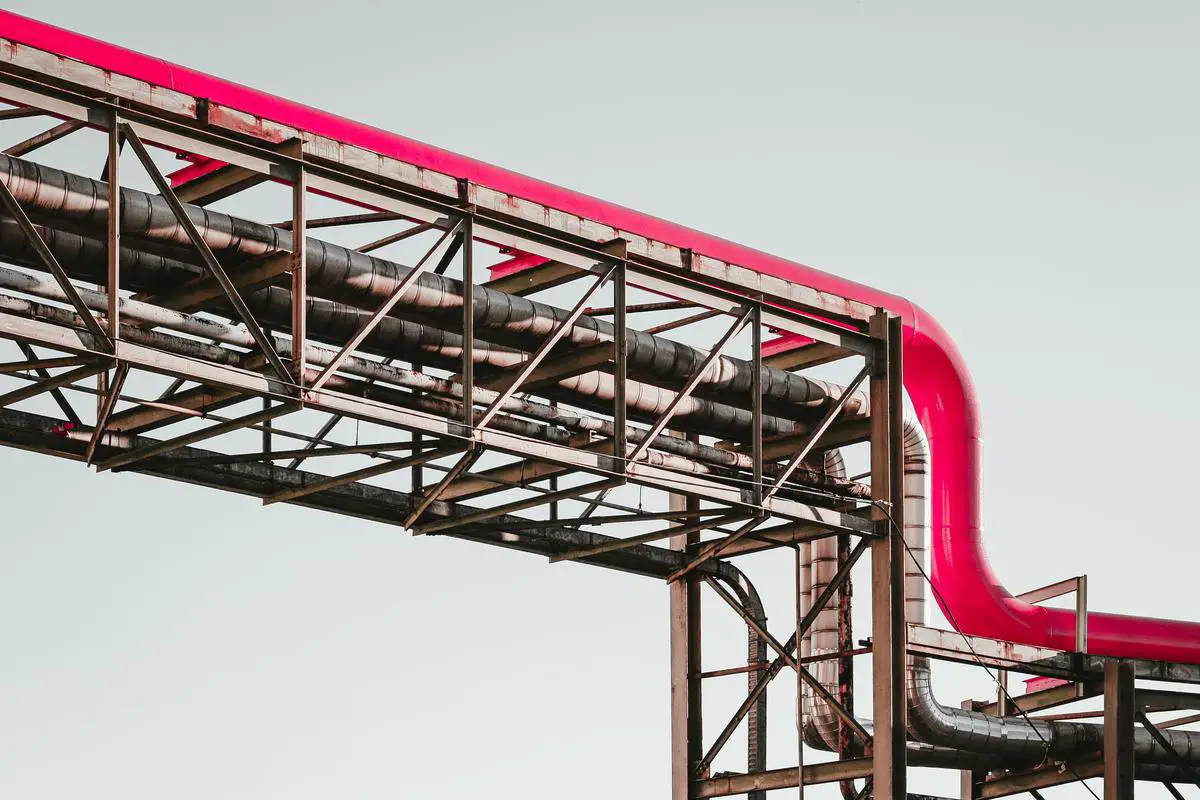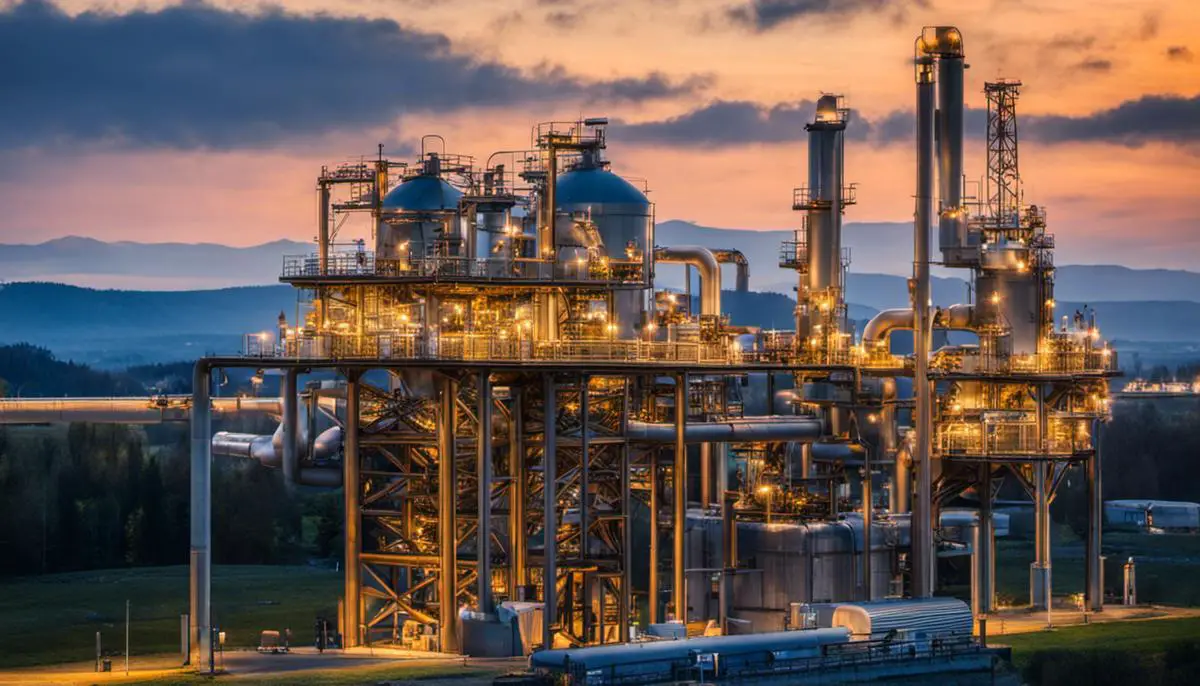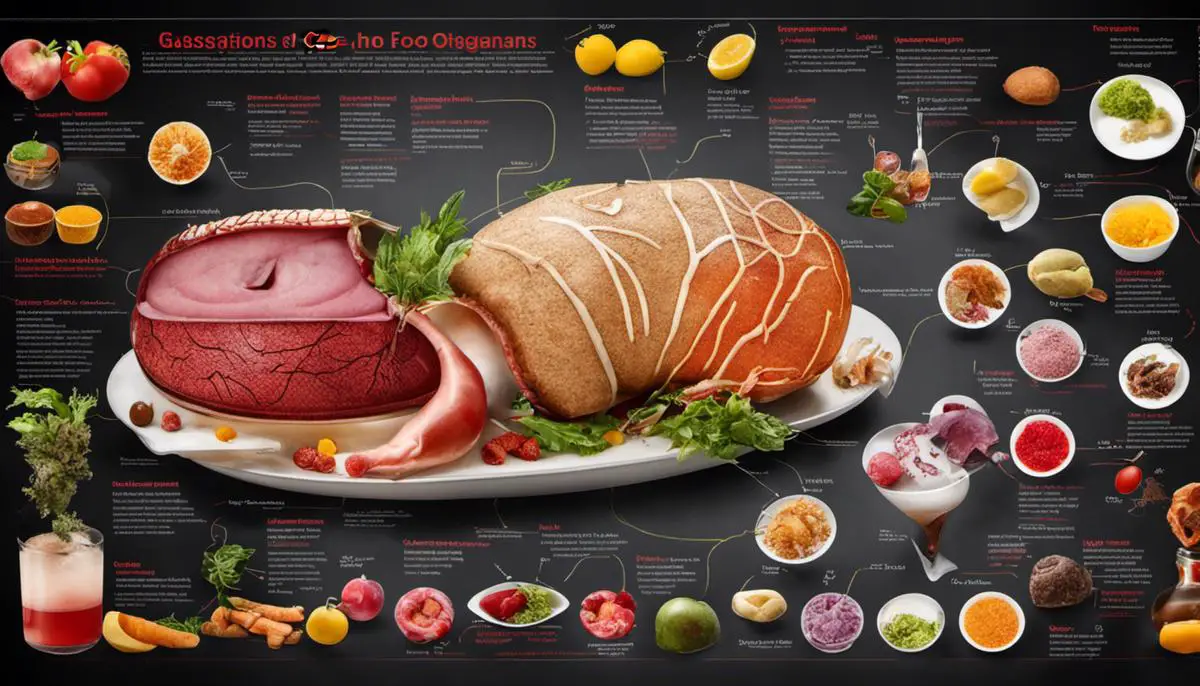It’s an everyday sensation most people have experienced – the uncomfortably full feeling of bloating and the embarrassment of excessive gas. Often, we attribute these conditions to factors like overindulgence in food or consumption of certain ‘gas-triggering’ food items. But understanding the root cause requires a more profound exploration of the complex journey our food undertakes, from ingestion to excretion. This detailed navigation through the digestive process, alongside an overview of dietary and lifestyle factors and the identification of potential underlying health conditions, provides a comprehensive view on the causes of excessive gas and bloating.
Understanding Digestion Process
Understanding the Digestive Process
The body initiates the digestive process with the help of the mouth, where salivary glands produce enzymes such as salivary amylase that begin the breakdown of food. This partially digested food, now known as a “bolus,” is then moved through the esophagus and into the stomach via a process known as peristalsis.
In the stomach, the food bolus is further broken down by hydrochloric acid, transforming it into a semi-fluid mass known as chyme. The stomach also produces certain enzymes that start protein breakdown. This chyme then enters the small intestine, where most of the digestion and nutrient absorption occur.
The small intestine breaks down the chyme further with enzymes produced in the pancreas and bile from the liver. Bile assists in fat digestion and absorption, whereas pancreatic enzymes work on digesting proteins, carbohydrates and fats. This enables the absorption of nutrients through the intestinal walls into the bloodstream.
The Creation and Role of Gas in Digestion
During this digestive process, gas is a natural and inevitable byproduct. Several factors contribute to gas production in the digestive tract. A significant portion of this gas is swallowed air. Every time you eat or drink, you are also swallowing small amounts of air, which can accumulate in the digestive system.
Another major producer of gas is the process of bacterial fermentation in the large intestine. After the small intestine has absorbed the majority of nutrients, the leftover semi-digested food reaches the large intestine. This undigested food is further processed by billions of bacteria, which break it down through fermentation, resulting in the creation of gas.
This bacterial activity is a normal part of the digestive process, and the gas produced consists mostly of odorless vapors—carbon dioxide, oxygen, nitrogen, hydrogen, and sometimes methane. These gases exit the body through the rectum (flatus) or are passed out of the mouth (burping).
Excessive Gas and Bloating Causes
Everyone experiences gas daily; however, excessive gas and bloating can be uncomfortable and sometimes indicative of digestive disorders. Certain high-fiber foods, for instance, can contribute to excessive gas. They include beans, lentils, broccoli, cabbage, onions, and carbonated drinks. This occurs because fiber-rich foods are difficult for the body to digest, resulting in more undigested food for bacteria to break down, creating more gas.
Chewing gum, smoking, and loose dentures can also lead to swallowing more air, and hence, more gas. Other medical conditions like gastroesophageal reflux disease (GERD), lactose intolerance, chronic intestinal disease, or even stress can contribute to excessive gas and bloating.
Changes in gut microbiota can also contribute to excessive gas creation. Certain populations of bacteria produce more gas when they breakdown food. So, an overgrowth of these specific populations might lead to more gas production.
Understanding Gas Formation: The Result of Digestion
Gas production is an intrinsic part of the digestive process. It is produced by swallowing air and the activities of intestinal bacteria during the process of fermentation in the large intestine. Overproduction of gas or bloating can be attributed to dietary choices, lifestyle habits, and certain health conditions. Gaining in-depth knowledge about these factors may assist you in modifying your diet or guide when to seek medical assistance.

Photo by martinadams on Unsplash
Common Causes of Excessive Gas and Bloating
Navigating Your Diet: Foods Known to Cause Gas and Bloating
Diet plays a major role in the occurrence of excessive gas and bloating. Certain carbohydrates are particularly challenging for our bodies to digest and, when broken down in the large intestine, can cause gas and bloating. Known offenders are foods such as beans, lentils, broccoli, onions, apples, prunes, peaches, and whole grains. Dairy products are another common culprit, especially for those with lactose intolerance.
Effects of Overeating on the Digestive System
A straightforward cause for excessive gas and bloating is overeating. Consuming an enormous quantity of food can make you feel bloated as it causes your stomach to stretch. In addition, overeating can prompt your body to produce more stomach acid, increasing the likelihood of acid reflux, indigestion, and consequently gas.
Eating at a Rapid Pace: Quick Consumption, Slow Digestion
Rapid consumption of food is another common factor leading to excessive gas and bloating. Eating too quickly can cause you to swallow air, which can lead to gas. It can also prevent the proper breakdown of food in your stomach, meaning it may ferment in your gut, producing gas and bloating.
Carbonated Beverages: A Gaseous Equation
Another everyday factor contributing to excess gas and bloating is the consumption of carbonated beverages. These drinks contain carbon dioxide, a gas. Drinking them may cause some of this gas to get trapped in your stomach, which can result in bloating and belching.
Gas-Producing Foods: Healthy but Gaseous
While fruits, vegetables, and whole grains are healthy dietary choices, they can also cause gas and bloating. These foods contain fiber, a type of indigestible carbohydrate. When fiber reaches your large intestine, it is fermented by gut bacteria, a process that produces gas.
Lifestyle Choices: Sedentary Habits, Smoking, and Alcohol Consumption
In addition to dietary choices, certain lifestyle habits can contribute to excessive gas and bloating. A sedentary lifestyle may slow down the digestive process, making it more likely for bloating and gas to occur. Smoking can cause you to swallow air, leading to both gas and bloating. Furthermore, alcohol can interfere with stomach acid production and slow down digestion, both of which can result in bloating and gas.
Effects of Certain Medications and Health Supplements
Medications and supplements can have side effects, including gas and bloating. Certain types of medicines, such as antacids, pain relievers, and weight loss drugs, can produce these symptoms. Similarly, nutritional supplements, particularly those high in fiber or certain types of sugar, can cause gas and bloating.
Each of these factors contributes to the intricate process of digestion and can potentially lead to gas and bloating. Having a solid understanding of these triggers can help guide your diet and lifestyle choices, ultimately helping to control and alleviate discomforting digestive issues.

Health Conditions Related to Gas and Bloating
Lactose Intolerance: A Common Cause of Excessive Gas and Bloating
Lactose intolerance is a widespread health issue that is directly associated with excessive gas and bloating. People with this condition find it hard to digest lactose, a natural sugar present in milk and various dairy products. When lactose is not effectively digested, it moves into the colon where it is fermented into gas by bacteria. The outcome is abdominal bloating, discomfort, diarrhea, and excessive flatulence. If you’re lactose intolerant, you might start to notice these symptoms shortly after eating dairy products.
Celiac Disease and Its Role in Gas and Bloating
Celiac disease is another health condition that can cause excessive gas and bloating. It is an autoimmune disorder where the ingestion of gluten leads to damage in the small intestine. Gluten is a protein found in wheat, barley, and rye, and is present in a wide range of food products. When an individual with celiac disease consumes gluten, their immune system reacts by damaging the villi, the small hair-like projections lining the small intestine that promote nutrient absorption. This leads to inflammation and bloating. More so, undigested food can pass into the colon, where it is fermented by gut bacteria and causes gas.
Gastrointestinal Infections Causing Gas and Bloating
Gastrointestinal (GI) infections are additional culprits of excessive gas and bloating. These infections can be caused by bacteria, viruses, or parasites. They often result in inflammation in the gastrointestinal tract, hindering normal digestion and absorption of nutrients. The inflammation may interfere with the movement of gas through the intestines, resulting in bloating and excessive gas. Moreover, certain types of bacteria that cause GI infections are known to produce gas, which can contribute to these symptoms.
Related Health Conditions: IBS and SIBO
Irritable Bowel Syndrome (IBS) and Small Intestinal Bacterial Overgrowth (SIBO) are other conditions associated with excessive gas and bloating. IBS is a chronic disorder affecting the large intestine, characterized by abdominal pain, bloating, and altered bowel habits. In many cases, IBS results in increased fermentation in the colon, leading to gas and bloating. On the other hand, SIBO occurs when there is an abnormal increase in the overall bacterial population in the small intestine, especially types of bacteria not commonly found in that part of the digestive tract. As these bacteria ferment foods, they produce gas, resulting in bloating and excessive gas.
Overview
Gas and bloating are common occurrences within the body, but when they become excessive, they may signpost certain underlying health conditions. These may range from lactose intolerance, celiac disease, gastrointestinal infections, to more serious issues like IBS, and SIBO. All these conditions tamper with the digestive process, leading to increased production of gas. Therefore, excessive bloating or persistent gas shouldn’t be taken lightly; they call for quick medical consultation. Regular health check-ups, appropriate dietary habits, and a cognizance of how your body responds to different types of foods are preventive measures that can help reduce such discomforting symptoms and uphold digestive system health. Indeed, these conditions can cause discomfort, but with an accurate diagnosis and effective treatment, they can be kept under control.

Lifestyle Factors and Gas Production
Lifestyle, Medications, and Their Contribution to Gas Production
There are multiple lifestyle elements that impact the health of your digestive system and consequently, stimulate excessive gas and bloating. One of these is stress; when an individual is under stress, the body’s normal functioning can be interrupted. This is particularly true for individuals with a predisposition to digestive problems as stress tends to amplify their symptoms, leading to an overproduction of gas.
Limited physical activity could be another contributing factor. Inactivity results in less efficient digestion, making it difficult for food to pass through the stomach and intestines, often leading to bloating, discomfort and increased gas production.
Additionally, several over-the-counter and prescription medications can exacerbate issues with gas and bloating. These include NSAIDs, iron supplements, aspirin and some types of antidepressants. Even medications meant to manage chronic health conditions, like heart disease, hypertension and diabetes, can unfortunately also affect digestion. If any medication-related digestive issues are suspected, it is crucial to consult your healthcare provider.
Lastly, smoking contributes largely to the disruption of normal gastrointestinal functioning. This can alter how the body processes and digenerates food. Nicotine, a common constituent of cigarettes, can relax the lower esophageal sphincter, paving the way for acid reflux and, consequently, causing bloating and gas.
Factors Influencing Digestive Health and Gas Production
Digestive health is greatly influenced by our lifestyle choices, such as stress levels, physical activity, medication usage, and smoking habits. Each of these factors can alter the normal functioning of our digestive system and potentially lead to a host of issues.
These conditions often slow the digestion process, promoting fermentation in the gut – a gas-producing activity. Slow digestion can further result in constipation, another common cause of gas and bloating.
Beyond this, our lifestyle also affects the balance of beneficial gut bacteria. Critical for healthy digestion and proper breakdown of certain foods, this bacterial balance, when disturbed, can prompt an overgrowth of specific bacteria and contribute to excessive gas and bloating.
Therefore, we can infer that modifying these lifestyle aspects – effectively managing stress, boosting physical activity, acknowledging medication side effects, and quitting smoking – may play a vital role in enhancing digestion and curtailing episodes of excessive gas and bloating.

Prevention and Treatment
Navigating the Gas Maze: Unraveling Causes and Factors
Excessive gas and bloating are usually the annoying side effects of a generally healthy bodily process known as digestion. It is natural for your body to generate some amount of gas while breaking down the food you consume, especially those rich in fiber, sugar, or starch. Moreover, the air you unknowingly swallow while eating, drinking, or talking also adds to the gas volume in your digestive system. Despite being a part of normal physiology, various other factors can upset the balance leading to increased gas production and resulting discomfort.
These factors range from diet-related indiscretions such as overeating or indulging in gas-producing foods and drinks, mechanical issues like eating too fast, or even certain medical conditions like irritable bowel syndrome (IBS) or lactose intolerance. Acknowledging and managing these causes can help reduce flatulence and resultant bloating.
Dietary Changes to Reduce Gas and Bloating
One of the most accessible remedies to excessive gas and bloating is modifying your diet. You can start by observing and identifying foods that seem to exacerbate your symptoms, which might include beans, lentils, broccoli, onions, and carbonated drinks. Decreasing your intake of these gas-triggering foods and beverages can help although everyone’s body reacts differently to foods so it’s important to identify your specific triggers. Additionally, eating smaller, more frequent meals instead of larger meals and drinking plenty of water can aid in digestion and reduce gas levels.
Over-the-Counter Medications
There are several over-the-counter medicines that can provide relief from gas and bloating. Simethicone, commonly found in products like Gas-X and Mylanta, works by making gas bubbles easier to pass. Alpha-galactosidase, an enzyme found in products like Beano and Bean-zyme, helps your body break down complex carbohydrates, reducing gas formation. Activated charcoal capsules may also absorb gas. It’s prudent to check with your pharmacist or healthcare provider before initiating any of these treatments.
Prescribed Treatments
If dietary changes and over-the-counter medications are ineffective, it’s crucial to consult a healthcare provider, as excessive gas could indicate an underlying health condition. Health care providers may prescribe a range of treatments, including antibiotics for bacterial overgrowth, treatments to remedy lactose intolerance or other nutrient-related issues, or medications tailored to reduce symptoms of IBS.
Lifestyle Modifications
Apart from dietary adjustments and medications, certain lifestyle changes can mitigate bloating and excessive gas. These include eating slower, avoiding chewing gum and hard candies (which can lead to swallowing air), getting regular exercise to help move gas through your system faster, and managing stress levels, as stress can also worsen bloating and gas build-up. Smoking can also contribute to excessive gas, thus quitting smoking could significantly alleviate symptoms. Finally, certain relaxing practices like taking mindful walks, engaging in yoga, or using deep breathing exercises can also help keep gas at a manageable level.
In general, prevention and management of excessive gas heavily rely on a combination of diet control, over-the-counter treatments, prescription medications, and lifestyle alterations. It’s essential to keep an open communication with your healthcare provider to tailor a suitable approach to end your discomfort. If you experience severe, ongoing bloating and gas issues, prompt medical attention is required, as it might be an indication of a more serious digestive disorder.

Photo by sippakorn on Unsplash
Overall, maintaining optimal digestive health and preventing excessive gas and bloating is a multi-faceted process. From mindful eating to maintaining an active lifestyle, from managing stress levels to avoiding certain notorious gas-producing foods and drinks, every small change can go a long way in enhancing digestive wellness. When these modifications fall short, over-the-counter remedies and prescribed treatments can offer relief. However, persistent symptoms might indicate a deeper medical issue and should prompt a visit to a healthcare professional. It’s time to bid adieu to the distress and discomfort of gas and bloating, by acknowledging its many causes, and embracing the path towards prevention and treatment.
